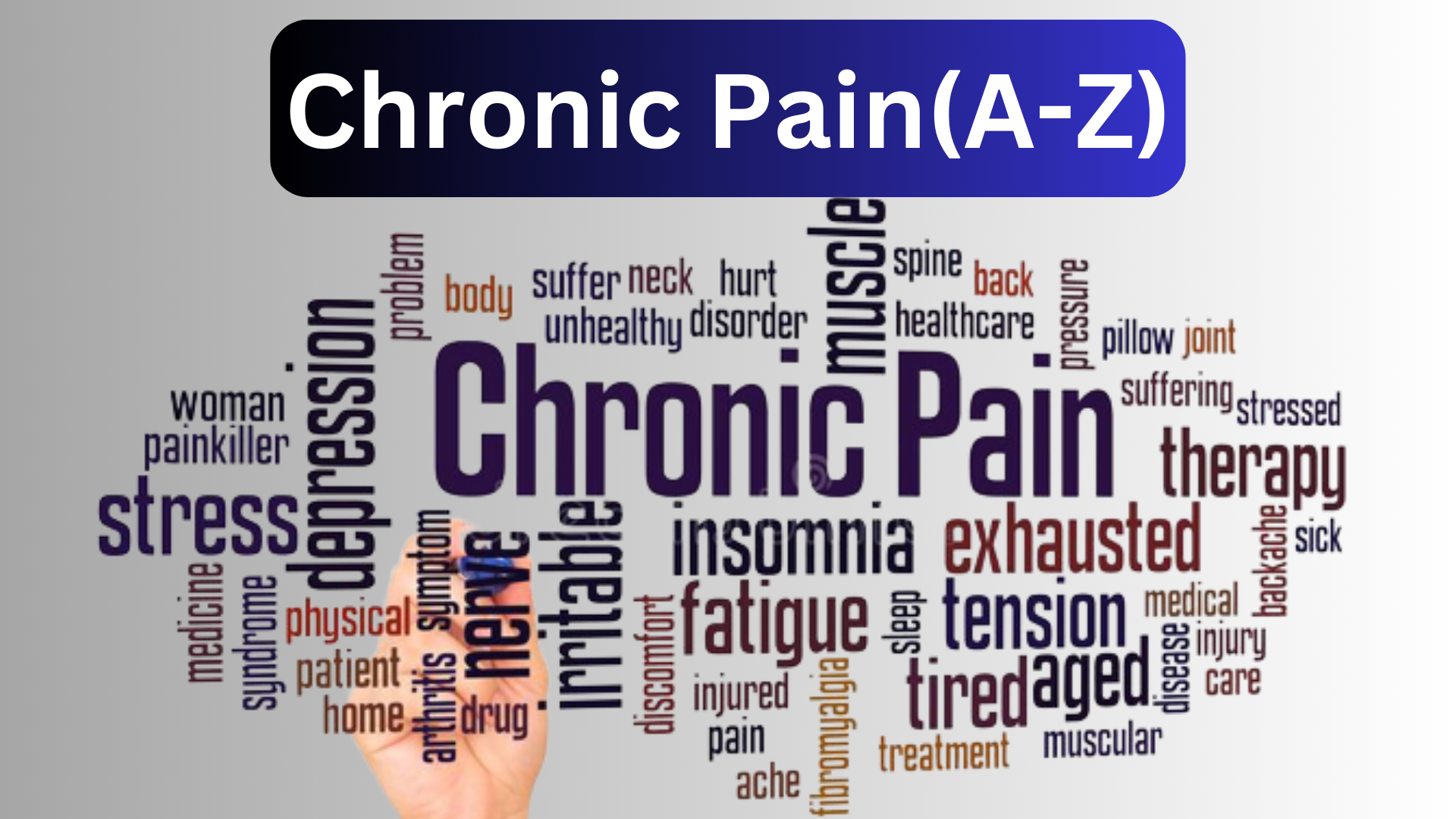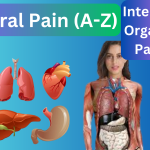For most of the people the chronic pain will lasts months or years and affects all parts of the body and it interferes with daily life and can lead to depression and anxiety.
The first step in treatment is finding and treating the cause. When it’s not possible, the most effective method for chronic pain is a combination of medication, therapy, and lifestyle changes.
What Is Chronic Pain?
It is one of the types of pain that lasts more than three months. Pain may occur all the time or it can come and go.
It can happen anywhere in your body. Chronic pain can interfere with your daily activities, such as work, socializing, and taking care of yourself and others.
It can lead to depression, anxiety, and trouble sleeping, which will make your pain worse. This response creates a vicious cycle.
Causes Of Chronic Pain:
Sometimes chronic pain has a clear cause. You may have a long-standing medical condition, such as arthritis or cancer that can cause constant pain.
Injuries and diseases: It might change your body, which makes you more sensitive to pain.
These changes can persist even after you have recovered from the original injury or disease, something like a sprain, broken bone, or a brief infection and it can cause you to have chronic pain.
Some people have chronic pain that is not linked to an injury or physical illness. Healthcare providers call this psychopathic response pain and it is caused by psychological factors such as stress, anxiety, and depression.
Most of the scientists believe this connection comes from low levels of endorphins in the blood. Endorphins are natural chemicals that induce positive feelings.
It is possible for pain to overlap for many reasons. For example, you may have two different diseases, or you may have migraines and mental pain as well.
Symptoms Of Chronic Pain:
The chronic pain affects your physical health, mood, and even your social life over time and this pain can lead to other symptoms such as:
- anxiety
- depression
- bad sleep
- feeling very tired or exhausted
- irritability
- guilt
- loss of interest in sex
- drug or alcohol use
- Marital or family problems
- job loss
- suicidal thoughts
Some people with chronic pain need to take more and more medications to deal with pain. This could cause them to become dependent on these drugs.
Treatment of Chronic Pain:
For chronic pain relief, the healthcare provider will try to identify and treat the cause first. But sometimes, the source cannot be found. If so, they resort to treatment or pain management.
Healthcare providers treat chronic pain in a number of ways. The method of treating the chronic pain depends on many factors, including:
- The type of pain you have and the cause of your pain, if known.
- Your age and overall health
The chronic pain treatment plan uses a variety of strategies, including medications, lifestyle changes, and therapy. If you have chronic pain, depression, and anxiety, it’s also important to get mental health treatment.
Depression or anxiety can make your chronic pain worse, fatigue changes in sleep, and decreased activity and it can make your chronic pain worse.
Medication Treatment of Chronic Pain:
Your healthcare provider may recommend certain medications for chronic pain relief, including:
- Anticonvulsants (medicines that prevent seizures) for nerve pain, like: Gabapentin 100mg | Gabapentin 400mg
- Antidepressants such as tricyclic antidepressants
- Corticosteroids.
- Muscle relaxants, like: Pain O Soma 500mg | Soma 350mg
- non-steroidal anti-inflammatory drugs (NSAIDs) or acetaminophen
- Topical products (applied to the skin) that contain a painkiller or mixture that makes you feel hot or cold
Opioids medicine like, Aspadol er 200mg & Tapal er 100mg are one the best brand name of tapentadol medication to treat chronic pain, if other medicine not works then this Er tablet given by doctor to treat chronic pain.
For this reason, it is often recommended that your healthcare provider try other pain treatment options before prescribing opioids. Some of the other medical treatments your healthcare provider may have you try including:
Transcutaneous electrical nerve stimulation (TENS):
This procedure sends small shocks through a patch on your skin. Electrical impulses can relieve pain.
Nerve block:
for this treatment, your healthcare provider will inject an anesthetic near your pain area to reduce sensation in that area. Nerve blocks can sometimes also provide diagnostic information and find the source of your pain.
Spinal steroid injection:
This procedure involves injecting an anti-inflammatory, steroid or corticosteroid into a space around your spinal cord called the spinal cord space in the abdomen for the treatment of chronic pain caused by irritation and inflammation of the spinal nerve roots.
What Tests Are Used To Diagnose Chronic Pain?
Your healthcare provider may examine your body and order tests to determine the cause of your chronic pain. They may have you pass the following tests:
- blood test
- Electromyography to test muscle function
- X-rays and MRI
- They conduct the nerve conduction studies to see if your nerves are responding properly
- Reflex and balance test
- cerebrospinal fluid test
- urine test
Can Lifestyle Changes Help Chronic Pain?
Four key lifestyle factors can influence chronic pain and help reduce it. Healthcare providers sometimes refer to them as the Four Pillars of Chronic Pain. They include:
Stress:
Stress plays a big part in chronic pain, so it’s important to try to reduce it as much as possible. Everyone has different techniques for managing stress but some techniques include meditation, mindfulness, and deep breathing.
Exercise:
30 minutes of low-intensity physical activity, such as walking or light swimming, for 30 minutes daily may help reduce pain. Exercise can also help relieve stress for some people. This is important to manage when you have chronic pain.
Diet:
It is important to eat a healthy diet to support your overall health. Your healthcare provider may recommend trying an anti-inflammatory diet by eliminating inflammatory foods such as red meat and refined carbohydrates.
Sleep:
If you are getting enough quality sleep it is important for your overall health. Sleep deprivation can make you gain weight. This can make chronic pain worse. Quality sleep is important for stress management.
Be sure to discuss these four lifestyle principles with your healthcare provider to determine how each applies to your chronic pain condition and how you can incorporate the change into your daily life.
Is There A Cure For Chronic Pain?
There is currently no cure for chronic pain. In addition to identifying and treating the cause of pain, for example, treating arthritis can sometimes stop joint pain.
Many people with chronic pain have no known cause and no cure. A combination of medications, therapies, and lifestyle changes are used to reduce pain.
What Is The Cause Of Chronic Pain?
Chronic pain has many causes and it may start with an illness or injury. You may have recovered from this condition for a long time but still have pain, or there could be an ongoing cause of the pain, such as arthritis or cancer.
Many people experience chronic pain with no signs of injury or evidence of past illnesses.
What Are The Symptoms Of Chronic Pain?
Most people faced the symptoms of chronic pain include mild to severe pain that does not go away as expected after an illness or injury. It can be shooting, burning, pain, or electric current. You may feel pain, tightness, or stiffness in the affected area.
Is Chronic Pain A Disease Or A Symptom?
Chronic pain can be a symptom of a chronic disease. But it usually lasts longer than the normal healing process and is often unable to identify other congenital diseases.




1 Comment